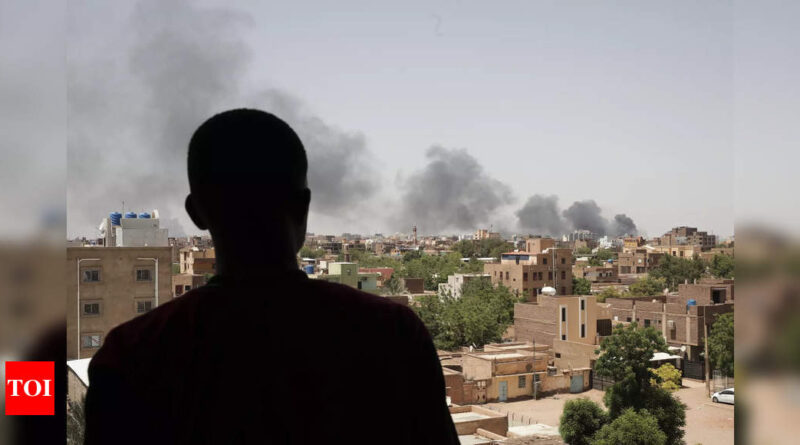UN fears more ‘displacement’ from Sudan despite ceasefire – Times of India
GENEVA: The United Nations refugee agency warned Tuesday of “further displacement” of people from Sudan after thousands streamed into neighboring Chad and South Sudan despite a tenuous ceasefire between the two warring Sudanese generals battling for control of the country.
The fighting has plunged Sudan into chaos, pushing the already heavily aid-dependent African nation to the brink of collapse.
Since the clashes erupted on April 15, at least 20,000 Sudanese have fled into Chad and some 4,000 South Sudanese refugees – who had been living in Sudan – have returned to their home country, UNHCR spokeswoman Olga Sarrado said Tuesday.
The figures could rise, she cautioned. Sarrado did not have figures for the five other countries neighboring Sudan, but UNHCR has cited unspecified numbers of those fleeing Sudan arriving in Egypt.
“The fighting looks set to trigger further displacement both within and outside the country,” she said, speaking at a U.N. briefing in Geneva.
The UNHCR was scaling up its operations, she said, even as foreign governments have raced to evacuate their embassy staff and citizens from Sudan. Many Sudanese have desperately sought ways to escape the chaos, fearing late their all-out battle for power once evacuations are completed.
Several previous cease-fires have failed, although intermittent lulls during the weekend’s major Muslim holiday allowed for dramatic evacuations of hundreds of diplomats, aid workers and other foreigners by air and land.
More than 800,000 South Sudanese refugees live in Sudan, a quarter of them in the capital of Khartoum, where they are directly affected by the fighting.
Marie-Helene Verney, the UNHCR’s chief in South Sudan, said from its capital of Juba that “the planning figure that we have for the most likely scenario is 125,000 returns of South Sudanese refugees into South Sudan, and 45,000 refugees,” Sudanese fleeing the fighting.
The U.N. Population Fund has said that the fighting threatens tens of thousands of pregnant women, including 24,000 women expected to give birth in the coming weeks. For 219,000 pregnant women across the country it is too dangerous to venture outside their homes to seek urgent care in hospitals and clinics amid the clashes, the agency said.
Dozens of hospitals have shuttered in Khartoum and elsewhere across the country due to the fighting, and dwindling medical and fuel supplies according to the Sudanese Doctors’ Syndicate.
“If the violence does not stop, there is a danger that the health system will collapse,” the U.N. agency warned last Friday.
The International Committee of the Red Cross welcomed the announced cease-fire as a “potential lifesaver for civilians” trapped in their homes in fighting-hit areas.
“It’s clear that this ceasefire must be implemented up and down the chain of command and that it must hold for it to give a real respite to civilians suffering from the fighting,” said Patrick Youssef, ICRC’s regional director for Africa. He called on the international community to help find a “durable political solution to end the bloodshed.”
Spokesman Jens Laerke of the U.N. Office for the Coordination of Humanitarian Affairs, said it has been forced to “reduce our footprint” because of the fighting. and he pointed to “acute shortages of food, water, medicines and fuel and limited communications and electricity” and new reports of looting of humanitarian warehouses and aid stockpiles.
“The humanitarian needs in Sudan were already at record levels before this recent eruption of fighting … some 15.8 million people – that’s about a third of the population – required humanitarian assistance,” he said.
“This (fighting) coming on top of it, is, I would say, more than just a slap in the face. It’s more than a fist in the face of those people who were already in need,” Laerke added, echoing the calls for “the fighting to stop.”
The fighting has plunged Sudan into chaos, pushing the already heavily aid-dependent African nation to the brink of collapse.
Since the clashes erupted on April 15, at least 20,000 Sudanese have fled into Chad and some 4,000 South Sudanese refugees – who had been living in Sudan – have returned to their home country, UNHCR spokeswoman Olga Sarrado said Tuesday.
The figures could rise, she cautioned. Sarrado did not have figures for the five other countries neighboring Sudan, but UNHCR has cited unspecified numbers of those fleeing Sudan arriving in Egypt.
“The fighting looks set to trigger further displacement both within and outside the country,” she said, speaking at a U.N. briefing in Geneva.
The UNHCR was scaling up its operations, she said, even as foreign governments have raced to evacuate their embassy staff and citizens from Sudan. Many Sudanese have desperately sought ways to escape the chaos, fearing late their all-out battle for power once evacuations are completed.
Several previous cease-fires have failed, although intermittent lulls during the weekend’s major Muslim holiday allowed for dramatic evacuations of hundreds of diplomats, aid workers and other foreigners by air and land.
More than 800,000 South Sudanese refugees live in Sudan, a quarter of them in the capital of Khartoum, where they are directly affected by the fighting.
Marie-Helene Verney, the UNHCR’s chief in South Sudan, said from its capital of Juba that “the planning figure that we have for the most likely scenario is 125,000 returns of South Sudanese refugees into South Sudan, and 45,000 refugees,” Sudanese fleeing the fighting.
The U.N. Population Fund has said that the fighting threatens tens of thousands of pregnant women, including 24,000 women expected to give birth in the coming weeks. For 219,000 pregnant women across the country it is too dangerous to venture outside their homes to seek urgent care in hospitals and clinics amid the clashes, the agency said.
Dozens of hospitals have shuttered in Khartoum and elsewhere across the country due to the fighting, and dwindling medical and fuel supplies according to the Sudanese Doctors’ Syndicate.
“If the violence does not stop, there is a danger that the health system will collapse,” the U.N. agency warned last Friday.
The International Committee of the Red Cross welcomed the announced cease-fire as a “potential lifesaver for civilians” trapped in their homes in fighting-hit areas.
“It’s clear that this ceasefire must be implemented up and down the chain of command and that it must hold for it to give a real respite to civilians suffering from the fighting,” said Patrick Youssef, ICRC’s regional director for Africa. He called on the international community to help find a “durable political solution to end the bloodshed.”
Spokesman Jens Laerke of the U.N. Office for the Coordination of Humanitarian Affairs, said it has been forced to “reduce our footprint” because of the fighting. and he pointed to “acute shortages of food, water, medicines and fuel and limited communications and electricity” and new reports of looting of humanitarian warehouses and aid stockpiles.
“The humanitarian needs in Sudan were already at record levels before this recent eruption of fighting … some 15.8 million people – that’s about a third of the population – required humanitarian assistance,” he said.
“This (fighting) coming on top of it, is, I would say, more than just a slap in the face. It’s more than a fist in the face of those people who were already in need,” Laerke added, echoing the calls for “the fighting to stop.”




